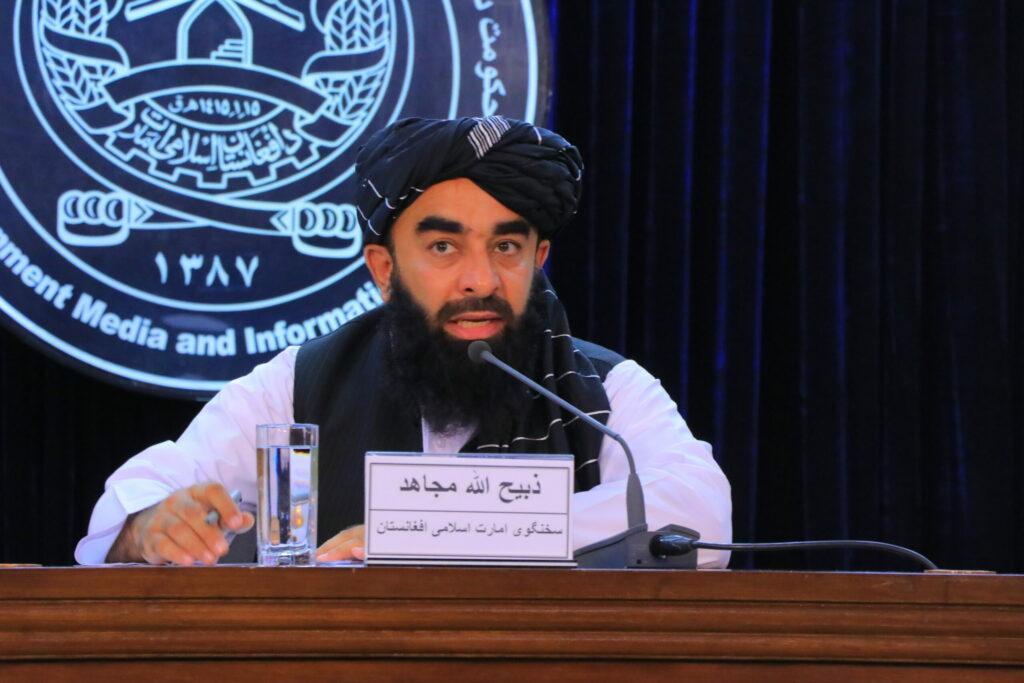
Kabul To Act If Afghan Soil Used Against Others: Mujahid
KABUL (Pajhwok): The Islamic Emirate of Afghanistan (IEA) chief spokesman says Pakistan does not welcome a strong, secure and developing central government in Afghanistan and has repeatedly tried to shift responsibility for its security onto Kabul, despite instability in border areas having roots that predate IEA's return to power.
Zabihullah Mujahid told reporters the recent Istanbul talks between Kabul and Islamabad- held under mediation of Qatar and Turkey following cross-border strikes and retaliatory attacks- ended today (Saturday) without results.
He said the IEA representatives, by special directives of the supreme leader, participated in Istanbul talks in good faith and with appropriate authority on two consecutive days (November 6 and 7), hoping that this time the Pakistani side, after consultation with its leaders, would approach the issue seriously and constructively, with a responsible attitude and present realistic and implementable demands to reach a fundamental solution.
Mujahid accused certain military circles in Pakistan of opposing stability in Afghanistan because they have historically benefited from insecurity, displacement and migration.
He claimed these groups benefit from instability and were now attempting to create pretexts to put Afghanistan in difficulty.
He added that neither the Pakistani public, political parties nor religious scholars support these anti-Afghan policies.
On the matter of the Tehreek-i-Taliban Pakistan (TTP), Mujahid said the group's emergence was not a new issue and has no direct connection to IEA.
He said the TTP emerged in 2002 in response to heavy Pakistani military operations and US drone strikes in the tribal areas and that Pakistan's own operations against the group - and TTP attacks inside Pakistan - have been ongoing since that time.
Mujahid provided a timeline of major Pakistani military operations against the TTP and in tribal districts, citing operations in South and North Waziristan and Orakzai Agency in 2002, Swat and Malakand in 2007, Bajaur in 2008, South Waziristan in 2009, Khyber Agency in 2011, North Waziristan in 2014 and operations in Tierah and Bara in Khyber Agency between 2014 and 2017.
He said these campaigns displaced roughly 3.08 million people, many of whom sought refuge in neighbouring Afghan provinces such as Khost, Paktika and Nangarhar.
Mujahid shared links to media reports as evidence, saying they demonstrate that Pakistani military involvement against Pashtun tribes and the TTP began long before the IEA returned to power.
He also claimed that during those years Pakistan acknowledged very heavy casualties - between 80,000 and 90,000 killed - in its so-called fight against terrorism.
He recalled incidents including the 2007 capture of 300 Pakistani soldiers in South Waziristan by TTP elements (later exchanged), and multiple high-profile attacks inside Pakistan between 2008 and 2014 that caused hundreds of casualties.
Addressing the situation of tribal refugees in Afghanistan since the IEA's return, Mujahid said that IEA has facilitated talks between the Pakistani government, Pakistani political and religious figures and the displaced tribes.
He added IEA relocated some tribal families from areas near the Durand Line to central Afghan regions, established camps to improve oversight, prohibited carrying of arms by displaced tribes, and set up a reform commission to resolve issues and maintain ongoing monitoring.
Mujahid said the IEA welcomed and supported Pakistan-TTP direct talks that once produced a long-term ceasefire, but alleged those talks were later sabotaged by certain Pakistani military circles.
He stressed that many of the tribal refugees now in Afghanistan arrived before the IEA's return and fled Pakistani military campaigns and violence, and that the IEA will welcome efforts to enable their safe return.
Finally, Mujahid reiterated that, despite these measures, the Afghan government remains committed to preventing anyone from using Afghan territory to interfere in another country's affairs and will act to stop such activities.
kk/ma

Legal Disclaimer:
MENAFN provides the
information “as is” without warranty of any kind. We do not accept
any responsibility or liability for the accuracy, content, images,
videos, licenses, completeness, legality, or reliability of the information
contained in this article. If you have any complaints or copyright
issues related to this article, kindly contact the provider above.

















Comments
No comment